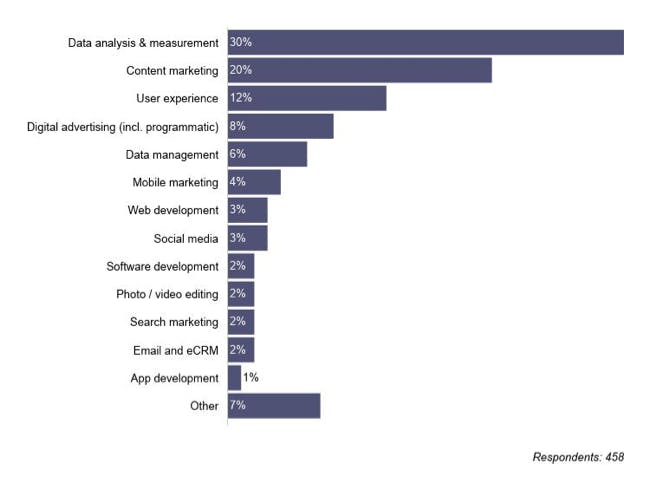It uses social media usage to make a very clear point – that ‘Ad people’ (I’d include all marketers in this) are not like the consumer. Whilst ‘Ad people’ are engaging with content on Twitter, LinkedIn and Instagram, the vast majority of consumers are not. They’re watching Line of Duty and EastEnders (if they’re in the UK). And they’re eating sandwiches that may not be made with £3.50 loaves of sourdough.

It’s an example of the screamingly obvious. So obvious, in fact, that I suspect many marketers never recognise this truth – that they often fail to truly understand the very consumers who they spend their big budgets attempting to persuade and convert.
As Ritson writes in Marketing Week, “the first rule of marketing is that you are not the market. All your thoughts, feelings and immediate responses to things like advertising, price and packaging are not just incorrect – they are dangerous.”
So let’s all agree, a few tweets are in no way representative of your audience. Indeed, are probably absolutely contradictory to what the mass of a brand’s consumers in Sheffield, or Inverness, or Exeter really think and feel.
This is why many client briefs completely miss the point, by failing to understand what their audience might actually want and need.
I don’t think this is down to arrogance, it’s obviously easy to default to your own subjective impressions of your consumer. It’s my belief that the only sure-fire way to fix this is by teaching marketers the basic skills required to truly understand their consumers (‘normal’ people) and what might motivate them. In fact, it might well be the most important training that you could do.
Training
Marketing is extremely focused on data right now. This is no surprise. In Econsultancy’s recent report Skills of the Modern Marketer, when marketers were asked what skill they could stake their career on learning in the future, the top response was data analysis and measurement.

Successful marketing in this increasingly digitised world is reliant on having and using data. Russell Parsons, Editor of Marketing Week, writes in the forward to Skills of the Modern Marketer that “The explosion in data and technology has offered marketers many more ways to reach, engage and serve customers”. He’s not wrong.
The problem is that marketers are often drowning in data, without having the necessary tools and skills to extract real meaning and useful insights.
Ritson again in Marketing Week: “Learning to separate your own instinctive thoughts and feelings from the actual insights from real consumers is, literally, the first thing a trained marketer learns to do well.”
At Econsultancy, we are finding that clients are increasingly asking for help to learn these skills, and most often, they’re looking for training focused specifically on turning research and data into powerful insights and inspiring briefs.
It’s right at the intersection of data science and innovative creative thinking, and it’s where the real magic happens. It’s the exciting bit!
We find that very few marketers (especially more junior marketers managing digital channels) know how to explore, identify and turn insights about their consumers into compelling marketing activities. Training them to do this, usually through highly participatory workshops where they work through real exercises, using real data, and practice these skills, is arguably the single most important investment you can make in improving your marketing performance. Sometimes this will involve sending participants out to watch real shoppers in stores. Or role-playing in groups. One trainer always brings an Empathy Belly to help his trainees step outside their own lives and experiences. It’s extremely effective.
Insightful marketing that makes your brand or product relevant and motivating for our consumers will save you a fortune, and make you famous.
Here’s what happens when marketers don’t really understand their audience:
Pepsi spend big bucks to identify themselves with the trend towards political activism (in their quickly pulled ad of 2017 featuring Kendall Jenner), without fully grasping that consumers demand direct, authentic stances, and not ‘fake’ and watered down versions of their politics to promote a brand. Pepsi got it badly wrong, was roundly ridiculed, and promptly became one of the biggest marketing fails of the decade. It was a shocker! And how about Brewdog’s ‘Beer for girls’? Or EA’s ‘Brass knuckles’ promotion (which was not only in poor taste, it was illegal).
But far more important are the countless examples of marketing that has led to wasted budgets and invisible work due to a lack of consumer understanding and insight.
When you do understand your audience, of course, you can create something truly transformative. How about Dove’s ‘Campaign for real beauty’, Marmite’s ‘Love it or hate it’, and Snickers’ ‘You’re not yourself when you’re hungry’. At the heart of each of these is a powerful insight into the lives of ‘normal’ people.
So, it all boils down to the marketers of today equipping themselves with the essential skills to build an accurate understanding of their audience, and extract meaningful insights that will ensure their marketing activities are effective.
It is not about turning marketers into data analysts. Rather, it’s about helping them to recognise those revelatory insights that will make for great work. As our Skills of the Modern Marketer report noted, “Interviewees for this report indicated that many marketers may not actually be expert at data analysis, but they are familiarising themselves with the vocabulary around data and the basic tools involved to extract insights”.
Learning this skill is vital if you’re going to help your brand cut through the clutter and have a real impact (and not in the way Pepsi did it!).
And the first step, as always, is to recognise the problem. To quote Bob Hoffman (The Ad Contrarian), “I think we would be wise to keep open minds and admit that a great deal of our understanding of consumer behaviour is incomplete at best, and wrong at worst”.
That’ll be a great start!
To learn more about Econsultancy training, get in touch today.

Comments